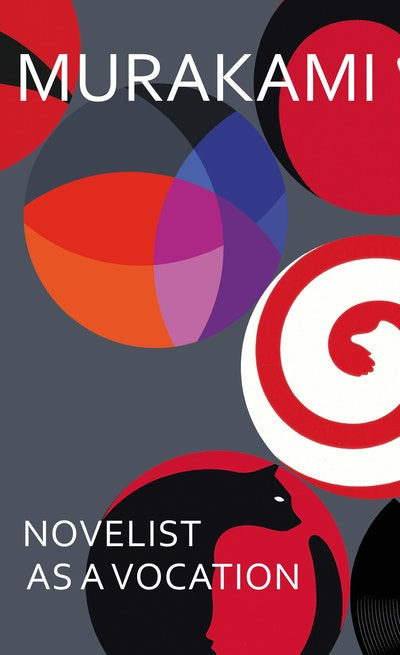How to write? That’s not quite the question that Haruki Murakami addresses in his recent book Novelist As A Vocation. Not quite. It’s a book that leans more toward memoir and slightly away from how-to. That is not to say it doesn’t contain writing advice, it does, it’s just that these notes of guidance are couched within stories of the author’s life as a writer.
Amongst the snippets of autobiography the book still captures the practical aspects of the craft; writing routines, publishing experiences, audience, contracts, planning, source material, originality, schedules and other behind the scenes insights. There is even a chapter on literary awards. The impulse for creativity and the weight of the writing process are in here too.
It’s reflective form means that there are passages that read a little too much like a book length acknowledgements section - in which thanks are given and dues are paid - but those moments never last for too long1. They are far outweighed by the interesting tales and the revealing accounts of a writer’s attachment to writing.
One thing that Murakami returns to is the development of his writing style. Failure led him to shorten and tighten. Partly, he used his translation skills to provide a model for how to write. Murakami’s descriptions of his style are of a sort of textual distillation. In one reflection he noted that:
‘it seems that I discovered my “original” voice and style, at the outset, not adding to what I already knew but subtracting from it. Think how many - far too many - things we pick up in the course of living, whether we choose to call it information overload or excess baggage, we have that multitude of options to choose from, so that when we try to express ourselves creatively, all those choices collide with each other and we shut down, like a stalled engine.’
The writing needs a brushing away of the superfluous. This sort of desk clearing appears as advice elsewhere. He describes how he tries to work on nothing else when producing a novel. It’s more than this though. Murakami is also highlighting the bigger problem he thinks a writer can face, which is the overload of information we now experience. Having too much in front of you doesn’t provide more source material, it hides the good stuff. It clutters the imagination, it would seem.
His writing, he thought, improved once he started to remove things and reduce or condense what he was doing. This was partly about sentences, but it was also about losing some of the baggage of knowledge that seemed to limit his thinking. In the book he talks about the type of knowledge and analysis he tended to focus on, choosing to avoid judgment in favour of closer observation. Attentiveness might be another way to label what is being described.
As well as an overabundance of information, absence is also considered. Murakami admonishes:
‘if you lament the lack of material you need to write, you are giving up way too easily. If you just shift your focus a little bit and slightly alter your way of thinking, you will discover a wealth of material lying about just waiting to be picked up and used. You only have to look. In the field of human endeavour, things that seem mundane at first glance can, if you persevere, give birth to an endless array of insights. All you need to do…is retain your healthy writerly ambition. That is the key.’
In abundance or in lack, the advice is to concentrate and focus, to find perspective. The message is one of trained and directed resourcefulness, either pushing away debris to find the thing that is hidden or finding a way of noticing where nothing is apparent. It is the ambition of the writer that is presented as the driving force for this refocusing.
Murakami has targets too. They are actually quite rigid. These targets are not just about the number of words, they are also about establishing and reinforcing a working routine - he compares it to clocking-on at one point. His ‘rule’ is to produce 10 old manuscript pages a day which, he notes, equates to 1600 words. And he means rule. On days when he ‘wants to write more,’ he still stops when he gets to the 10 page (1600 word) target. Similarly, on days when he doesn’t ‘feel like writing,’ he still, he says, forces himself to produce the same amount. This method is adopted because, he suggests, ‘it is especially important to maintain a steady pace when tackling a big project’. 1600 words might seem a little more than a steady pace.
If that type of routine sounds arduous, Murakami warns the reader that their plan and the direction of their writing might need changing. He suggests that one indicator of a misplaced focus is a lack of pleasure from the writing. ‘If you are not enjoying yourself when you’re engaged in what seems important to you,’ he says, ‘then there’s likely something wrong’.
As the repetition and pacing of his routine might indicate, rhythm is important in Murakami’s writing. In fact, he identifies it as the most crucial thing. He explains at one point that:
‘From the beginning, therefore, my intention was to write as if I were playing an instrument. I still feel like that today. I sit tapping away at a keyboard searching for the right rhythm, the most suitable chords and tones. This is, and has always been, the most important element in my literature’
The musical comparison - of composition and performance - brings with it an emphasis on rhythm that he identifies as being the key to his practice. This includes tone, style and timbre too. The writing vocation being explored is established in the repeated beat of the keyboard within the routines of the writing day. That beat is also to be found, as rhythm, in the musical composition of Murakami’s sentences. 1600 beats per day.
Murakami has a lesson based on reviews of his work: ‘Since I became a writer, though, and started regularly to publish books, there is one lesson I’ve learned. Which is that no matter what or how I write, somebody’s going to say something bad about it’.




